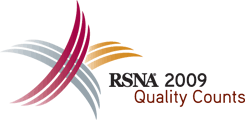
Abstract Archives of the RSNA, 2009
Nimrat Singh Mangat MBBS, MRCP, Presenter: Nothing to Disclose
Dow-Mu Koh MBBS, Abstract Co-Author: Nothing to Disclose
Sue Ashley, Abstract Co-Author: Nothing to Disclose
Gina Brown MD, MBBS, Abstract Co-Author: Nothing to Disclose
Preoperative strategies are increasingly guided by CT/MRI based prognostic staging. Although minimum data set for reporting prognostic histopathological data in colorectal cancer is promoted as best practice, in radiology, reporting by employing freeform descriptions of tumor staging is the standard. We undertook a prospective analysis of the added value of proforma assisted colorectal cancer reporting compared with standard reporting techniques to determine whether this produced a significant improvement in reporting of minimum data.
Imaging reports from 121 patients with biopsy proven colorectal cancer referred for case conference discussions of preoperative staging of CT (n=121) and MRI (n=55) scans over six months were prospectively analysed. Identical imaging relating to each referred patient were independently reported by a specialist gastrointestinal radiologist at the referring hospital using freeform descriptions (standard report) and for the case conference meeting using proforma reporting (proforma report). Completeness of radiology reporting of prognostic factors by standard versus proforma reporting was determined by analysing reports for the identification of presence or absence of minimum dataset information comprising known individual prognostic factors in colorectal cancer.
Using standard reporting the completeness of reporting of individual prognostic factors namely peritoneal disease, T/M stage, extramural venous invasion and circumferential resection margin (CRM) status ranged from 1.5%-78.2%(95% CI:0.3-87.1%) compared with 95.5%-100%(95% CI:87.5-100%) using proforma reporting. No significant change was demonstrated in N stage reporting. For MRI staged tumours (n=55), all prognostic factors were reported in 54 patients (98.1%) using proforma reporting compared with 11 patients (20.0%)using standard reporting. In 55 patients staged with MRI, CRM status was not mentioned in 40 (72.7%) cases using standard reporting. 6 of these 40 patients (15%) were subsequently described to have involved margins by proforma reporting.
Proforma based reporting significantly improves quality and completeness of staging reports compared with current practice.
Proforma based reporting should be universally adopted in the case conference setting, as it will enable the consistent and systematic identification of high risk patients for preoperative treatment
Mangat, N,
Koh, D,
Ashley, S,
Brown, G,
Colorectal Cancer Radiology Reporting in the Multidisciplinary Setting: The Importance of High Quality Proforma Reporting. Radiological Society of North America 2009 Scientific Assembly and Annual Meeting, November 29 - December 4, 2009 ,Chicago IL.
http://archive.rsna.org/2009/8008806.html

